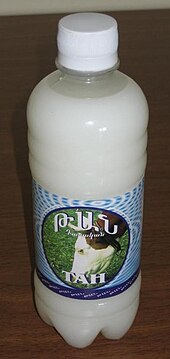This is an old revision of this page, as edited by Fleetham (talk | contribs) at 04:42, 7 April 2011 (copy edit (kept Iran first)). The present address (URL) is a permanent link to this revision, which may differ significantly from the current revision.
Revision as of 04:42, 7 April 2011 by Fleetham (talk | contribs) (copy edit (kept Iran first))(diff) ← Previous revision | Latest revision (diff) | Newer revision → (diff)Doogh (Template:Lang-fa dūgh [duːɢ]); (Template:Lang-ku, also abdúgh; also mastaw or doo, abdugh, or tahn by Armenians) is a yogurt-based beverage. Popular in Iran and also found in Afghanistan, Azerbaijan, Armenia, Iraqi, Syria, Turkey, and the Balkans, it is closely related to Ayran.


Etymology
The word Doogh is from the Persian verb دوشیدن (Dushidan) which means "to milk". Doogh means "that which comes from milking". The Kurdish abdugh translates as "ab"-water and "dugh"-yogurt.
Preparation
Doogh is prepared by beating unflavored yogurt until smooth, then diluting with water to a consistency similar to whole milk. Doogh is generally served chilled, or over ice.
Traditionally, doogh is left unrefrigerated for 2–3 days in order to allow the yogurt cultures to ripen and fermentation to occur- imparting a natural carbonation. The carbonation in commercially-produced doogh typically comes from the use of carbonated water. As a result, commercially-produced doogh generally has harsher carbonation and coarser bubbles.
Variations
Salt (and sometimes pepper) is added, and commonly dried mint or pennyroyal is mixed in as well following the preparation of doogh. A variation includes adding diced cucumbers to provide a crunchy texture to the beverage. Some varieties of doogh lack carbonation entirely.
See also
References
- Project Document for a Regional Standard for Doogh (CX/NEA 09/5/8) Agenda Item 5. JOINT FAO/WHO FOOD STANDARDS PROGRAMME. FAO/WHO COORDINATING COMMITTEE FOR THE NEAR EAST. Fifth Session. Tunis, Tunisia, 26 - 29 January 2009